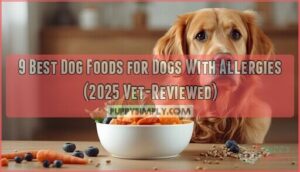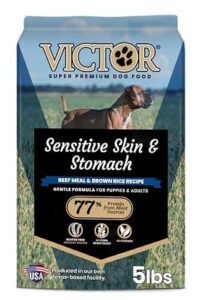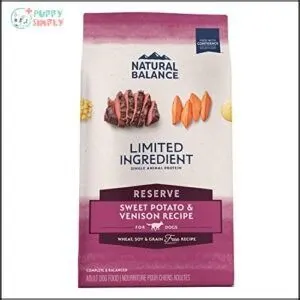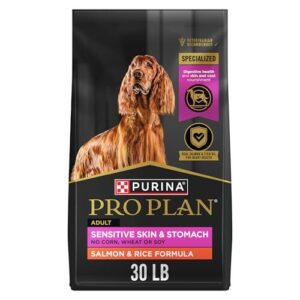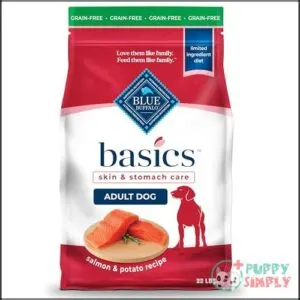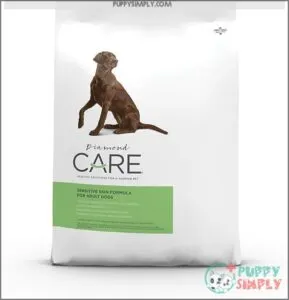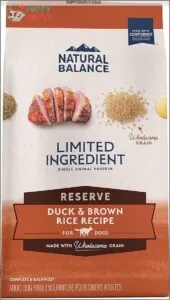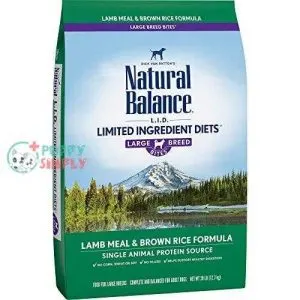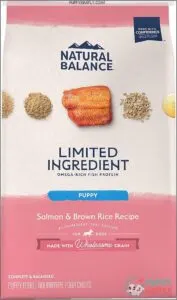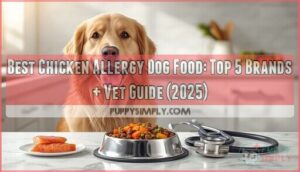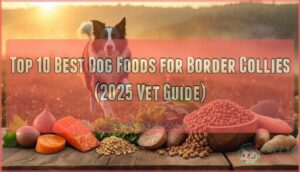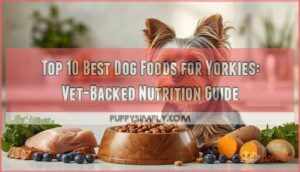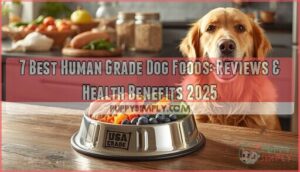This site is supported by our readers. We may earn a commission, at no cost to you, if you purchase through links.
Your dog’s constant scratching might not be dry skin or fleas—it could be the chicken in their bowl. Food allergies affect roughly 10% of all dogs with skin problems, yet they’re often the last thing owners suspect when their pet starts showing symptoms.
The culprit is usually a protein your dog has eaten for years without issue, making these allergies particularly tricky to identify. Unlike seasonal allergies that come and go, food sensitivities create year-round discomfort that escalates without dietary intervention.
Finding the right dog food for dogs with allergies means exploring limited ingredient formulas, novel proteins, and hydrolyzed options—each designed to eliminate triggers while maintaining complete nutrition. The good news? Once you identify and remove the problematic ingredient, most dogs show dramatic improvement within weeks.
Table Of Contents
- Key Takeaways
- Signs Your Dog Has Food Allergies
- Common Dog Food Allergens to Avoid
- Choosing Allergy-Friendly Dog Foods
- Top 9 Dog Foods for Allergies Reviewed
- 1. Victor Sensitive Skin Dog Food
- 2. Natural Balance Sweet Potato Dog Food
- 3. Purina Pro Plan Sensitive Skin Dog Food
- 4. Blue Buffalo Salmon Dog Food
- 5. Brothers Turkey Dog Food
- 6. Sensitive Skin Dog Food Formula
- 7. Natural Balance Duck Dog Food
- 8. Natural Balance Lamb Meal Dog Food
- 9. Natural Balance Salmon Puppy Food
- Transitioning Your Dog to New Allergy Food
- Nutritional Considerations for Allergic Dogs
- When to Consult Your Veterinarian
- Frequently Asked Questions (FAQs)
- What’s the best food to feed a dog with allergies?
- What foods are good for dogs with itchy skin?
- What is the most common food allergy in dogs?
- What meat are dogs least allergic to?
- Can dogs outgrow food allergies over time?
- How do probiotics help dogs with allergies?
- Are certain breeds predisposed to food allergies?
- Do food allergies affect a dogs behavior?
- Is there a link between skin allergies and diet?
- How long does allergy testing take for dogs?
- Conclusion
Key Takeaways
- Food allergies affect roughly 10% of dogs with skin problems and typically stem from proteins your dog has eaten for years without issue—beef, chicken, and dairy are the most common culprits, triggering year-round discomfort that won’t resolve without dietary changes.
- Limited ingredient diets, novel proteins like venison or duck, and hydrolyzed protein formulas can reduce allergy symptoms by 20–70% within 6–12 weeks, with most dogs showing dramatic improvement once you identify and remove the problematic ingredient.
- Transitioning to allergy-friendly food requires a gradual 7–14 day shift while monitoring for adverse reactions like vomiting, diarrhea, or worsening skin issues—about 13% of dogs show allergic reactions within the first day, so careful symptom tracking is essential.
- Veterinary-guided elimination diets spanning 8–12 weeks remain the gold standard for diagnosing food allergies, with controlled reintroduction confirming the offending ingredient in 70–80% of cases and ensuring your dog receives complete, balanced nutrition during dietary restrictions.
Signs Your Dog Has Food Allergies
Food allergies in dogs can show up in ways that might surprise you—it’s not always just an upset stomach. Your dog’s body can react to problem ingredients through their skin, digestive system, ears, and even their eyes or breathing.
Here’s what to watch for so you can spot the signs early and get your pup the help they need.
Skin Irritation and Persistent Itching
Persistent scratching, licking, and chewing signal skin allergies in your dog. Food allergens trigger immune responses that disrupt the skin barrier, causing pruritus in up to 60% of affected dogs. You’ll notice red, inflamed patches—often on paws, ears, and belly—that worsen without intervention.
Food allergies disrupt your dog’s skin barrier, causing persistent scratching and inflamed patches in up to 60% of affected dogs
Inflammation reduction through hypoallergenic diets can decrease skin issues by 20–40% over several weeks, making allergy testing methods and proper pruritus management essential for relief. Understanding the main topic is vital for effective analysis and discussion of complex information.
Gastrointestinal Upset (Vomiting, Diarrhea)
While skin reactions often steal the spotlight, gut health reveals equally telling signs of food allergies. Up to 50% of dogs with food sensitivities experience chronic vomiting or diarrhea as primary allergy symptoms. You might notice:
- Soft to watery stools 2–5 times daily during flares
- Vomiting episodes 1–3 days weekly despite normal appetite
- Stomach problems appearing 6–12 weeks after introducing trigger ingredients
- Intermittent digestive issues persisting for months
- Improvement within 2–4 weeks on hypoallergenic diets
These digestive health disruptions demand attention—they’re your dog’s body signaling something’s wrong.
Chronic Ear Infections
Ear infections that keep coming back often signal underlying food allergies—40–70% of allergic dogs develop recurrent otitis externa. You’ll recognize telltale signs: head shaking, odor from the ear canal, and redness inside the flap.
Allergy testing methods and dietary therapy options work best when paired with regular ear canal cleaning.
Infection prevention strategies start with identifying allergen triggers through elimination diets, stopping the cycle before it becomes chronic.
Understanding the theme and subtheme analysis is essential for recognizing patterns in allergy development.
Respiratory and Eye Symptoms
Though less common than skin allergies, respiratory issues and eye symptoms occasionally show up in food-allergic dogs. You might notice watery eyes, conjunctivitis, or mild nasal discharge—signs that appear year-round rather than seasonally. Studies show 5–10% of dogs with food allergies develop ocular health problems or sneezing.
Your dog’s immune system sometimes triggers these reactions alongside gastrointestinal or canine allergy symptoms.
Common Dog Food Allergens to Avoid
Not all proteins and grains trigger the same response in every dog, but certain ingredients show up repeatedly as culprits behind allergic reactions. Your dog’s immune system can mistake these common food components for threats, setting off a cascade of uncomfortable symptoms.
Let’s look at the most frequent offenders you’ll want to watch for when reading ingredient labels.
Beef, Chicken, and Dairy Proteins
When you see your dog scratching constantly or dealing with stomach troubles, beef, chicken, and dairy often stand as the culprits. These three allergens drive 20–30% of canine food allergies:
- Beef reactions can cross-react with lamb in 12% of sensitive dogs
- Chicken sensitivity frequently appears alongside other poultry proteins
- Dairy intolerance affects 5–10% of food-allergic dogs
- Multi-protein cases see 25–40% fewer relapses with specialized diets
Wheat, Soy, and Corn Ingredients
Many grain-free dog foods still contain corn, with 52% using corn gluten as a primary ingredient, complicating allergy diagnoses. Soy appears in 41% of “limited ingredient” formulas as a hidden filler, while 7–12% of dogs show cross-reactivity between soy and other legumes.
You’ll need to scrutinize ingredient labels carefully, since wheat intolerance and corn alternatives don’t always deliver truly hypoallergenic canine nutrition.
Eggs, Fish, and Other Animal Proteins
While egg sensitivity affects only 2–5% of dogs with food allergies, fish allergy can trigger symptoms in up to 8% of cases—salmon and whitefish top the list. Novel proteins offer a strategic alternative:
- Venison, duck, or bison succeed in 55–75% of elimination-diet responders
- Protein hydrolysis breaks down allergens, achieving 60–90% positive outcomes
- Hypoallergenic formulas minimize animal byproducts that complicate canine nutrition
Novel ingredient diets reduce allergy symptoms effectively.
Choosing Allergy-Friendly Dog Foods
Once you’ve identified what’s triggering your dog’s allergic reactions, the next step is finding a food that works around those sensitivities. The right diet can make all the difference between constant scratching and a comfortable, happy pup.
Let’s look at the main types of allergy-friendly formulas you’ll encounter when shopping for your dog.
Limited Ingredient Diets
Limited ingredient diets strip away the guesswork by offering simplified recipes with a single protein and one or two novel carbs—making it easier to pinpoint what triggers your dog’s reaction. In controlled trials, dogs showed reduced allergens and skin lesions by 21% on average. Veterinarians consider these hypoallergenic formulas the first-line approach for suspected food allergies, with roughly 62% of dogs improving within six weeks.
| Feature | Why It Matters |
|---|---|
| Single Protein | Minimizes exposure to common triggers like beef or chicken |
| Novel Carbs | Reduces risk from wheat, soy, and corn sensitivities |
| Simplified Recipes | Helps identify specific allergens during elimination diets |
| Hypoallergenic Formulas | Aids therapeutic diets for dogs with confirmed food allergies |
Novel Protein Sources
When your dog hasn’t encountered a protein before, their immune system can’t react to it—that’s the foundation of novel protein diets. Switching to venison, duck, or kangaroo helps 40–60% of allergic dogs within six to eight weeks.
Here are standout options:
- Kangaroo and venison show higher cross-reactivity avoidance in ingredient sourcing trials
- Rabbit formulations reduced itching scores in double-blind allergen testing studies
- Insect protein from brands like Cravin Cricket and Jiminys offers hypoallergenic dietary formulation with complete amino acid profiles
Veterinary oversight ensures protein variety meets your dog’s nutritional needs.
Grain-Free and Gluten-Free Options
You’ll find grain-free and gluten-free diets helpful when your dog reacts to wheat, corn, or barley—though true gluten sensitivity is rare in canines. These formulas use potatoes or peas as carbohydrate sources and accounted for 18% of US dog food sales in 2023.
Limited ingredient grain-free options work well for dogs with multiple sensitivities, offering hypoallergenic diets that support skin health.
Hydrolyzed Protein Formulas
Hydrolyzed diets represent the benchmark when other hypoallergenic options fail. Protein hydrolysis breaks molecules down to below 10 kDa—too small to trigger IgE responses—preventing allergy symptoms in 55–70% of dogs during dietary therapy.
Your veterinarian may recommend these formulas for severe food allergies or protein sensitivity, especially when beef, chicken, or soy are culprits. Expect faster relief within two weeks.
Top 9 Dog Foods for Allergies Reviewed
Now that you know what to look for in allergy-friendly dog food, let’s explore some specific options that meet those criteria.
Each of the following products offers unique features designed to address different types of allergies and sensitivities. We’ve reviewed nine veterinary-approved formulas to help you find the right match for your dog’s needs.
1. Victor Sensitive Skin Dog Food
Victor Sensitive Skin Dog Food features beef meal as the primary protein, paired with gluten-free grains like brown rice and millet. This limited ingredient approach sidesteps common food allergens, making it ideal for dogs with sensitivities.
The formula is hypoallergenic, fortified with omega-3 and omega-6 fatty acids to strengthen skin health and reduce inflammation from skin allergies. Additionally, prebiotics and probiotics support gut integrity, while the VPRO blend delivers targeted dog nutrition.
This food is suitable for all life stages, but it’s recommended to switch gradually over 7–14 days to ensure a smooth transition.
| Best For | Dogs with sensitive skin, food allergies, or digestive issues who need a gluten-free, limited-ingredient diet with hypoallergenic ingredients. |
|---|---|
| Brand | VICTOR |
| Primary Protein | Beef |
| Form | Pellet |
| Age Range | All Life Stages |
| Weight | 5 lb |
| Grain Status | Gluten-free grains |
| Additional Features |
|
- Beef meal as the first ingredient provides high-quality protein while avoiding common allergens like chicken
- Omega-3 and omega-6 fatty acids support healthy skin and coat, reducing itching and inflammation
- Prebiotics and probiotics promote gut health and strengthen the immune system
- Higher price point compared to standard dog food brands
- Some owners report an unpleasant kibble smell
- Requires a gradual 7–14 day transition period when switching foods
2. Natural Balance Sweet Potato Dog Food
Natural Balance’s Sweet Potato & Venison formula offers a novel protein source that your dog likely hasn’t encountered before, reducing the likelihood of triggering canine allergies. This limited ingredient diet relies on venison to build strong muscles while sweet potatoes provide digestible fiber without grains.
The grain-free option eliminates common allergens like wheat and soy, making it hypoallergenic for dogs with food allergies. Fish oil delivers omega fatty acids to calm irritated skin.
Since it’s formulated for all life stages, you won’t need to switch foods as your dog ages.
| Best For | Dogs with food sensitivities or allergies who need a limited ingredient diet with a single novel protein source. |
|---|---|
| Brand | Natural Balance |
| Primary Protein | Venison |
| Form | Pellet |
| Age Range | All Life Stages |
| Weight | 4 lb |
| Grain Status | Grain-free |
| Additional Features |
|
- Single animal protein (venison) reduces allergy triggers and supports muscle development
- Grain-free formula with sweet potatoes provides digestible fiber without common allergens like wheat or soy
- Suitable for all life stages, so you won’t need to switch foods as your dog grows or ages
- Some customers report an unpleasant smell that dogs and owners find off-putting
- Mixed reviews on taste—while some dogs love it, others refuse to eat it entirely
- Grain-free formulas have raised concerns about potential heart issues in certain dogs, so consult your vet first
3. Purina Pro Plan Sensitive Skin Dog Food
If your dog needs a diet backed by veterinary nutrition science, Purina Pro Plan Sensitive Skin offers hydrolyzed salmon protein that breaks down allergens before they trigger your dog’s immune system. This formula includes omega-3 and omega-6 fatty acids to repair damaged skin barriers and reduce scratching.
It meets AAFCO standards while avoiding corn and wheat—common culprits in food allergies. You’ll find this hypoallergenic option through most veterinary clinics, making it easy to access expert-recommended dog food when managing persistent skin issues.
| Best For | Dogs with food-related skin allergies or chronic itching who need a vet-backed, science-formulated diet with hydrolyzed proteins to minimize immune reactions. |
|---|---|
| Brand | Purina Pro Plan |
| Primary Protein | Salmon |
| Form | Dry |
| Age Range | Adult |
| Weight | 30 lb |
| Grain Status | Contains oat meal |
| Additional Features |
|
- Uses hydrolyzed salmon protein that’s broken down to reduce allergic triggers, plus omega fatty acids to repair skin barriers and cut down on scratching
- Meets AAFCO nutrition standards while skipping corn and wheat, two ingredients that commonly cause food sensitivities in dogs
- Widely available through veterinary clinics and pet retailers, making it easy to get expert-recommended food without hunting around
- Some customers have reported quality control problems, including finding bugs or worms in bags of food
- Price point runs higher than standard dog foods, which can add up quickly for larger dogs or multi-dog households
- Mixed results on stomach tolerance—while it helps many dogs, some still experience diarrhea or digestive upset during the transition
4. Blue Buffalo Salmon Dog Food
When your dog needs relief from food allergy symptoms, Blue Buffalo’s salmon-based formula delivers fish protein as a novel diet alternative to beef or chicken. This grain-free option eliminates corn, wheat, and soy—traditional triggers for many allergic dogs—while providing omega-rich fatty acids that repair damaged skin.
You’ll notice the hypoallergenic approach here: salmon stands alone as the primary protein, reducing cross-reactivity risks. With veterinary advice confirming omega-3’s role in coat health, this mainstream choice helps manage sensitivities without prescription requirements.
| Best For | Dog owners looking for a single-protein, grain-free option to help manage food sensitivities or allergies without needing a prescription diet. |
|---|---|
| Brand | Blue Buffalo |
| Primary Protein | Salmon |
| Form | Dry |
| Age Range | Adult |
| Weight | 22.2 lb |
| Grain Status | Grain-free |
| Additional Features |
|
- Salmon as the primary protein offers a novel alternative to common allergens like beef and chicken
- Grain-free formula eliminates corn, wheat, and soy, which are frequent triggers for allergic reactions
- Omega-3 and omega-6 fatty acids support skin repair and promote a healthier, shinier coat
- Higher price point compared to many standard dog food brands
- Some bags may have inconsistent kibble sizes, which can be frustrating for portion control
- May not work for all dogs with allergies, as some can still react to fish or other ingredients in the formula
5. Brothers Turkey Dog Food
For dogs struggling with food allergy symptoms like persistent scratching or digestive upset, Brothers Complete Turkey & Egg formula offers a hypoallergenic approach through limited ingredient design. This novel ingredient diet centers on turkey meal benefits and egg protein value—delivering 36% minimum protein without common triggers like beef, chicken, or grains.
You’ll appreciate the digestive health support from protected probiotics and selective prebiotics, which target gut stability often compromised in allergic dogs. The grain-free formulation caters to sensitivities while meeting AAFCO standards for all life stages.
| Best For | Dogs with multiple food sensitivities who need a high-protein, limited ingredient diet that avoids common allergens like beef, chicken, and grains. |
|---|---|
| Brand | BROTHERS DOG FOOD |
| Primary Protein | Turkey |
| Form | Pellet |
| Age Range | All Life Stages |
| Weight | 5 lb |
| Grain Status | Not specified |
| Additional Features |
|
- Novel protein sources (turkey and egg) reduce allergic reactions while delivering 36% protein for muscle maintenance
- Protected probiotics and prebiotics support gut health, which helps dogs dealing with digestive issues from allergies
- Grain-free formula eliminates common triggers like corn, wheat, and soy while meeting nutritional standards for all life stages
- Significantly more expensive than standard dog food brands, with frequent price increases reported by customers
- Some dogs experience digestive problems including diarrhea and vomiting despite the hypoallergenic formulation
- Quality control issues like punctured bags and unresponsive customer service have frustrated some buyers
6. Sensitive Skin Dog Food Formula
If your pup battles ongoing skin allergies and sensitive stomach issues, Diamond CARE Sensitive Skin formula offers a hypoallergenic solution built around a single hydrolyzed salmon protein source.
You’ll find canine nutrition essentials—omega fatty acids for skin health, antioxidants including vitamin E for allergy prevention, and proprietary probiotics targeting food sensitivities—all in a grain-free, limited ingredient design.
Studies show hydrolyzed protein diets resolve allergy symptoms in 50–60% of dogs with confirmed reactions, making this approach practical for managing persistent skin issues.
| Best For | Dogs dealing with chronic skin allergies, food sensitivities, or digestive problems who need a single-protein, grain-free diet that’s backed by clinical research. |
|---|---|
| Brand | Diamond CARE |
| Primary Protein | Hydrolyzed Salmon |
| Form | Dry |
| Age Range | Not specified |
| Weight | 8 lb |
| Grain Status | Grain-free |
| Additional Features |
|
- Hydrolyzed salmon as the only protein source helps avoid allergic reactions in 50–60% of dogs with confirmed food allergies
- Omega fatty acids and vitamin E work together to reduce skin inflammation and support immune health
- Probiotics aid digestion while the limited ingredient formula makes it easier to pinpoint and avoid trigger ingredients
- Higher price point compared to regular dog food brands
- Small kibble size might not work well for larger breeds or dogs who prefer bigger pieces
- Results vary—some dogs show no improvement, and the 7–10 day transition period requires patience and careful monitoring
7. Natural Balance Duck Dog Food
When your dog reacts to beef or chicken, duck offers a novel ingredient path forward. Natural Balance Duck Dog Food centers on a single animal protein source paired with brown rice to support digestive health and allergy prevention.
You’ll find limited ingredient hypoallergenic formulas that meet AAFCO standards while addressing dog food allergies through targeted nutrition.
Research shows duck as a novel protein reduces cross-reactive allergies in 54% of dogs with prior sensitivities, making these dog food options worth considering for persistent allergy management.
| Best For | Dogs with sensitivities to common proteins like beef or chicken who need a limited ingredient diet that supports digestion and reduces allergic reactions. |
|---|---|
| Brand | Natural Balance |
| Primary Protein | Duck |
| Form | Pellet |
| Age Range | Adult |
| Weight | 4 lb |
| Grain Status | Contains brown rice |
| Additional Features |
|
- Duck as a novel protein reduces cross-reactive allergies in 54% of dogs with prior sensitivities, making it effective for allergy management
- Limited ingredient formula with brown rice supports healthy digestion while meeting AAFCO standards for complete nutrition
- Single animal protein source helps identify and eliminate food triggers in dogs with skin issues or digestive problems
- Some customers report digestive issues like vomiting after their dogs eat this food, requiring careful monitoring during transition
- Mixed reviews on smell and palatability mean it may not work for picky eaters or dogs with specific taste preferences
- Availability issues make it difficult to find certain flavors or sizes in stores consistently
8. Natural Balance Lamb Meal Dog Food
When traditional proteins trigger reactions, lamb meal stands as a tried-and-tested novel protein alternative for managing dog food allergies.
Natural Balance Lamb Meal Dog Food delivers a limited ingredient formula that pairs lamb with brown rice, supporting both skin health and digestive issues through balanced omega fatty acids.
This hypoallergenic approach meets AAFCO standards while offering allergy prevention benefits—clinical data shows lamb-based dog food options reduce reactivity in 40–60% of sensitive dogs.
You’re getting targeted nutrition designed specifically for protein-responsive cases.
| Best For | Large breed dogs with food sensitivities or skin allergies who need a single-protein, limited-ingredient diet with digestible carbohydrates. |
|---|---|
| Brand | Natural Balance |
| Primary Protein | Lamb |
| Form | Dry |
| Age Range | All Life Stages |
| Weight | 28 lb |
| Grain Status | Contains brown rice |
| Additional Features |
|
- Lamb meal as a novel protein reduces reactions in 40–60% of allergy-prone dogs, plus it avoids common triggers like corn, wheat, and soy.
- Brown rice offers gentle fiber for healthy digestion while omega fatty acids support skin health and coat shine.
- Meets AAFCO standards for all life stages, so you can feed it from puppyhood through senior years without switching formulas.
- Higher price point compared to standard dog food brands, which adds up for large breed feeding schedules.
- Not suitable if your dog has existing lamb or rice allergies—you’ll need a different protein source entirely.
- Larger bag size and dimensions (28 lbs, 26.5″ long) mean storage space becomes an issue in smaller homes.
9. Natural Balance Salmon Puppy Food
Growing dogs with allergy symptoms need specialized nutrition that won’t compromise their development. Natural Balance Salmon Puppy Food tackles this challenge with a single-protein hypoallergenic formula containing 28% protein and added DHA for brain health.
The limited ingredient approach reduces exposure to common allergens while supporting digestive health and skin barrier function. Shifting puppies to this salmon-based option provides allergy prevention benefits alongside complete AAFCO-compliant nutrition.
When exploring dog food options for young allergic dogs, this grain-inclusive formula offers targeted support during critical growth phases.
| Best For | Puppies with food sensitivities or suspected allergies who need a single-protein formula that supports healthy growth without compromising digestive health or skin barrier function. |
|---|---|
| Brand | Natural Balance |
| Primary Protein | Salmon |
| Form | Pellet |
| Age Range | Puppy |
| Weight | 4 lb |
| Grain Status | Contains brown rice |
| Additional Features |
|
- Single animal protein source (salmon) with limited ingredients reduces exposure to common allergens while providing 28% protein for proper development
- Includes DHA for brain development and omega-6 fatty acids that support healthy skin and coat during critical growth phases
- Grain-inclusive formula with brown rice offers digestive support and meets AAFCO standards for complete puppy nutrition
- May not appeal to all puppies since some dogs don’t prefer the salmon flavor over traditional chicken or beef options
- Limited ingredient list might not provide enough variety for puppies without sensitivities or allergies
- Packaging quality issues reported during shipping, with some bags arriving slightly torn or damaged
Transitioning Your Dog to New Allergy Food
Switching your dog to a new allergy-friendly food isn’t something you should rush. A gradual shift over 7–14 days helps prevent digestive upset and gives your dog’s system time to adjust to the new ingredients.
Here’s what you need to watch for during this process and how to get portion sizes right.
Monitoring for Adverse Reactions
Once you’ve begun the dietary shift, watch closely for any signs that your dog’s body isn’t cooperating. Adverse effects can appear quickly—about 13% of dogs show allergic reactions within the first day, while 42% develop symptoms over 1–2 weeks.
Track what you’re seeing with simple daily notes on itching, stool changes, or ear redness. This symptom tracking helps you spot patterns and gives your vet concrete data for dietary adjustments.
If vomiting, diarrhea, or worsening allergy symptoms emerge, pause the new food and seek veterinary guidance. Managing allergies means staying alert during those critical first weeks.
Adjusting Portion Sizes
Beyond watching for reactions, you’ll need to nail down the right portion size—because even a perfect allergy-friendly dog food won’t help if your dog’s eating too much or too little. Most adult dogs with allergies require 25–30 kcal per pound daily, but calorie calculation depends on activity level and life stage.
Use a kitchen scale instead of a cup for portion control accuracy. Split the daily amount into 2–3 meals to support weight management and reduce digestive upset. Adjust by 5–10% every few weeks based on your dog’s body condition, ensuring their dietary needs stay aligned with their canine diet goals.
Nutritional Considerations for Allergic Dogs
When you’re managing your dog’s allergies through diet, nutrition becomes more than just filling the bowl—it’s about rebuilding their health from the inside out. The right balance of nutrients can strengthen skin barriers, support immune function, and help your dog feel comfortable again.
Let’s look at three key nutritional factors that make a real difference for allergic dogs.
Essential Fatty Acids for Skin Health
When your dog scratches relentlessly, essential omega fatty acids can help restore balance. Dietary supplements rich in EPA and DHA reduce skin inflammation, while maintaining proper omega balance bolsters healing from within. These fatty acid benefits aren’t just theoretical—studies show noticeable improvements in canine nutrition when you address skin allergies through targeted omega-3 supplementation.
- Linoleic acid (omega-6) strengthens the skin barrier, reducing moisture loss by up to 20%
- EPA and DHA directly combat inflammation at 40–100 mg/kg daily
- Balanced ratios (omega-3 to omega-6 around 1:1 to 1:4) optimize skin health
- Marine-sourced supplements work better than plant-based options for hypoallergenic nutrition for skin health
Complete and Balanced Diets
A complete and balanced diet meeting AAFCO standards forms the backbone of allergy management. Your dog needs nutrient profiles customized to their size and life stage—protein sources, fats, vitamins, and minerals all calibrated correctly.
Hydrolyzed diets show 60–70% success rates in controlled trials, though palatability issues affect 20–30% of cases. Limited ingredient and hypoallergenic formulas maintain digestibility while minimizing reactions, but therapeutic or prescription diets offer stricter manufacturing control for severe sensitivities.
Meeting AAFCO Standards
AAFCO compliance ensures your dog food delivers the protein, fat, vitamins, and minerals essential for their life stage. Labels must state whether the formula meets standards through feeding trials or formulated nutrient profiles—both verify adequacy.
For allergies, therapeutic diets often undergo stricter testing, but any over-the-counter option should display “complete and balanced” wording. Check the guaranteed analysis panel and consult your veterinarian for confirmation.
When to Consult Your Veterinarian
While you can manage mild sensitivities at home, some situations require professional guidance to protect your dog’s health. Your veterinarian can diagnose true food allergies, track symptom patterns over time, and design specialized diet plans for dogs with severe reactions.
Let’s look at three key scenarios where veterinary input becomes essential.
Diagnosing Food Allergies With Elimination Diets
Your veterinarian will likely recommend an elimination diet spanning 8–12 weeks to diagnose food allergies accurately. During this food trial, you’ll feed your dog a therapeutic diet with a single novel or hydrolyzed protein.
Symptom tracking throughout this diagnostic process helps pinpoint triggers. If clinical signs resolve, a controlled reintroduction phase confirms the offending ingredient in 70–80% of cases, guiding long-term veterinary care.
Monitoring Ongoing Symptoms
Consistently track your dog’s allergy symptoms—including itching intensity, coat condition, stool quality, and ear health—over 6–12 weeks to gauge dietary effectiveness.
About 74% of dogs show skin-related signs within six weeks of food introduction, while 38% see GI improvement within eight weeks.
Regular health monitoring and symptom tracking guarantee your ongoing care strategy adapts as your dog’s needs evolve.
Customizing Diet Plans for Severe Allergies
When your dog’s allergies don’t respond to standard hypoallergenic or limited ingredient diets, veterinary guidance becomes essential for creating a customized nutrition plan. About 32% of owners need prescription diets for severe allergies, and hydrolyzed protein formulas can reduce antigen exposure by up to 70%.
Managing allergies through tailored food trials requires:
- Structured elimination protocols spanning 8–12 weeks for accurate allergy testing
- Novel proteins like venison or kangaroo, improving symptoms in 60% of cases
- Strict nutrient balance meeting AAFCO standards for your dog’s life stage
- Regular diet planning adjustments based on symptom response
- Veterinary oversight to guarantee complete nutrition during restrictions
Frequently Asked Questions (FAQs)
What’s the best food to feed a dog with allergies?
There isn’t a one-size-fits-all answer. Food trials with limited ingredient or hypoallergenic formulas help identify triggers, while nutrient balance maintains immune health and digestive function throughout the elimination process.
What foods are good for dogs with itchy skin?
Like choosing the right key for a stubborn lock, selecting foods rich in omega-3 fatty acids—such as salmon or flaxseed—can release skin health, easing itchy skin relief while supporting hypoallergenic canine nutrition and allergy management.
What is the most common food allergy in dogs?
Beef tops the list as the most frequent food allergy culprit, affecting roughly 20-30% of allergic dogs. Dairy and chicken follow closely, though your dog’s protein sensitivity can vary greatly based on exposure history.
What meat are dogs least allergic to?
Novel proteins like venison, duck, and rabbit rarely trigger canine allergies since most dogs haven’t been exposed to them.
These hypoallergenic protein sources succeed in 60–80% of elimination diets, making them ideal for managing food allergies.
Can dogs outgrow food allergies over time?
Your dog’s immune system can surprise you—food allergies may fade slightly over time in 20-30% of cases, yet sensitization often persists.
Recurrence after dietary reintroduction remains common, so vigilant monitoring matters.
How do probiotics help dogs with allergies?
Probiotics modulate your dog’s immune response by balancing gut microbiota, potentially reducing itching and skin reactions by 15–30%.
They work best alongside hypoallergenic diets, supporting microbiome balance and offering meaningful allergy relief for many dogs.
Are certain breeds predisposed to food allergies?
Yes, certain breeds show higher rates of food allergies. Labrador Retrievers, Golden Retrievers, and West Highland White Terriers demonstrate elevated genetic predisposition, with up to 25% of canine allergy cases linked to breed-specific factors.
Do food allergies affect a dogs behavior?
A happy dog is a healthy dog,” as the saying goes. Absolutely—food allergies trigger behavioral changes like increased scratching, paw licking, restlessness, and irritability.
Canine anxiety and stress responses often spike during allergy symptoms, affecting overall well-being and activity levels.
Is there a link between skin allergies and diet?
Absolutely. Between 20–40% of dogs with chronic skin issues have an underlying food allergy contributing to symptoms.
Dietary management targeting specific allergen triggers can improve skin barrier function and reduce immune response-driven inflammation.
How long does allergy testing take for dogs?
Allergy testing timelines for canine health vary considerably. Your veterinarian can complete serum-based allergy panels within 1-2 weeks, but elimination food trials require 8-12 weeks to accurately identify triggers and confirm diagnostic results.
Conclusion
Finding the right dog food for dogs with allergies is like solving a puzzle—each piece matters, but the complete picture brings relief. Your dog’s comfort depends on identifying triggers, selecting appropriate formulas, and maintaining nutritional balance throughout the shift.
While the process requires patience and veterinary guidance, the reward is clear: a happier, healthier companion free from constant discomfort. Trust the evidence, watch for improvements, and remember that dietary management remains your most powerful tool against food allergies.

